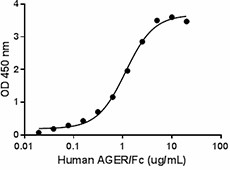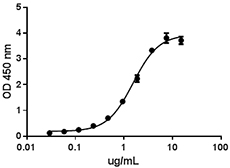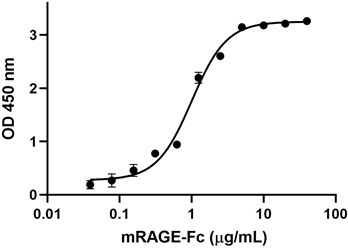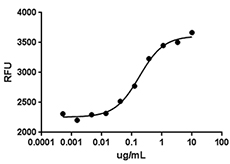- Regulatory Status
- RUO
- Other Names
- S100 Calcium-binding protein A9, Cystic Fibrosis Antigen B, Calgranulin B (CAGB, CGLB), Myeloid-related protein 14 (MRP14),
- Ave. Rating
- Submit a Review
- Product Citations
- publications

-

When mouse S100A9 is immobilized at 5 µg/mL, human AGER/Fc binds with EC50 of 0.8 - 3.2 µg/mL in a functional ELISA.
S100A9 is a member of the S100/calgranulin family of proteins containing 2EF-hand calcium-binding motifs. S100A9 is mainly expressed in cells of the myeloid lineage and is present in circulating neutrophils and monocytes. S100A9 expression is also transiently induced in keratinocytes after epidermal injury and in psoriasis where pro-inflammatory cytokines induce its expression. S100A9 is mostly cytoplasmic, but can be translocated to plasma membrane or released into the extracellular environment upon cellular activation. S100A9 preferentially interacts with S100A9 to form a heterodimer S100A8/A9, also known as calprotectin. S100A8/A9 functions as a danger associated molecular pattern (DAMP) molecule and stimulates innate immune cells via binding to pattern recognition receptors such as Toll-like receptor 4 (TLR4) and receptor for advanced glycation endproducts (AGER). Binding to TLR4 and AGER activates the MAP-kinase and NF-kappa-B signaling pathways resulting in the amplification of the proinflammatory cascade. The extracellular functions of S100A8/A9 also include the recruitment of leukocytes, promotion of cytokine and chemokine production, and regulation of leukocyte adhesion and migration. S100A8/A9 displays apoptosis-inducing activity against various tumor cells and also has antimicrobial activity by depriving bacterial pathogens of essential trace metals such as Zn2+ and Mn2+.
Product DetailsProduct Details
- Source
- Mouse S100A9 (a.a. Ala2-Lys113, accession # P31725) was expressed in E.coli.
- Molecular Mass
- The 129 amino acid recombinant protein has a predicted molecular mass of approximately 14.8 kDa. The DTT-reduced and non-reduced proteins migrate at approximately 14 kDa by SDS-PAGE. The predicted N-terminal amino acid is Ala.
- Purity
- >95%, as determined by Coomassie stained SDS-PAGE.
- Formulation
- 0.22 µm filtered protein solution is in PBS, 5 mM DTT, pH 7.2
- Endotoxin Level
- Less than 0.1 EU per µg protein as determined by the LAL method.
- Concentration
- 10 and 25 µg sizes are bottled at 200 µg/mL. 100 µg size and larger sizes are lot-specific and bottled at the concentration indicated on the vial. To obtain lot-specific concentration and expiration, please enter the lot number in our Certificate of Analysis online tool.
- Storage & Handling
- Unopened vial can be stored between 2°C and 8°C for up to 2 weeks, at -20°C for up to six months, or at -70°C or colder until the expiration date. For maximum results, quick spin vial prior to opening. The protein can be aliquoted and stored at -20°C or colder. Stock solutions can also be prepared at 50 - 100 µg/mL in appropriate sterile buffer, carrier protein such as 0.2 - 1% BSA or HSA can be added when preparing the stock solution. Aliquots can be stored between 2°C and 8°C for up to one week and stored at -20°C or colder for up to 3 months. Avoid repeated freeze/thaw cycles.
- Activity
- When mouse S100A9 is immobilized at 5 µg/mL, human AGER/Fc binds with EC50 of 0.8 - 3.2 µg /mL in a functional ELISA.
- Application
-
Bioassay
- Application Notes
-
BioLegend carrier-free recombinant proteins provided in liquid format are shipped on blue-ice. Our comparison testing data indicates that when handled and stored as recommended, the liquid format has equal or better stability and shelf-life compared to commercially available lyophilized proteins after reconstitution. Our liquid proteins are verified in-house to maintain activity after shipping on blue ice and are backed by our 100% satisfaction guarantee. If you have any concerns, contact us at tech@biolegend.com.
- Product Citations
-
Antigen Details
- Structure
- Homodimer
- Distribution
-
Neutrophils, Monocytes, Keratinocytes
- Function
- Pro-inflammatory molecule
- Interaction
- Neutrophils, Monocytes
- Ligand/Receptor
- Toll-like receptor 4 (TLR4) and receptor for advanced glycation endproducts (AGER)
- Bioactivity
- Measured by its ability to bind AGER
- Biology Area
- Cell Biology, Neuroscience, Stem Cells, Synaptic Biology
- Molecular Family
- Cytokines/Chemokines, Growth Factors
- Antigen References
-
1. Bhardwaj RS, et al. 1992. Eur. J. Immunol. 22:1891.
2. Hunter MJ, et al. 1998. J. Biol. Chem. 273:12427.
3. Hofmann MA, et al. 1999. Cell 97:889-901.
4. Cross SS, et al. 2005. Histopathology 46:256.
5. Zenz R, et al. 2005. Nature 437:369.
6. Hermani A, et al. 2006. Exp. Cell Res. 312:184.
7. Vogl T, et al. 2007. Nature Med. 13:1042.
8. Benedyk M, et al. 2007. J. Invest. Dermatol. 127:2001.
9. Corbin BD, et al. 2008. Science 319:962.
10. Gebhardt C, et al. 2008. J. Exp. Med. 205:275.
11. Loser K, et al. 2010. Nature Med. 16:713-717.
12. Kang JH, et al. 2015. Immunology 144:79-90. - Gene ID
- 20202 View all products for this Gene ID
- UniProt
- View information about S100A9 on UniProt.org
Related Pages & Pathways
Pages
Related FAQs
- Why choose BioLegend recombinant proteins?
-
• Each lot of product is quality-tested for bioactivity as indicated on the data sheet.
• Greater than 95% Purity or higher, tested on every lot of product.
• 100% Satisfaction Guarantee for quality performance, stability, and consistency.
• Ready-to-use liquid format saves time and reduces challenges associated with reconstitution.
• Bulk and customization available. Contact us.
• Learn more about our Recombinant Proteins. - How does the activity of your recombinant proteins compare to competitors?
-
We quality control each and every lot of recombinant protein. Not only do we check its bioactivity, but we also compare it against other commercially available recombinant proteins. We make sure each recombinant protein’s activity is at least as good as or better than the competition’s. In order to provide you with the best possible product, we ensure that our testing process is rigorous and thorough. If you’re curious and eager to make the switch to BioLegend recombinants, contact your sales representative today!
- What is the specific activity or ED50 of my recombinant protein?
-
The specific activity range of the protein is indicated on the product datasheets. Because the exact activity values on a per unit basis can largely fluctuate depending on a number of factors, including the nature of the assay, cell density, age of cells/passage number, culture media used, and end user technique, the specific activity is best defined as a range and we guarantee the specific activity of all our lots will be within the range indicated on the datasheet. Please note this only applies to recombinants labeled for use in bioassays. ELISA standard recombinant proteins are not recommended for bioassay usage as they are not tested for these applications.
- Have your recombinants been tested for stability?
-
Our testing shows that the recombinant proteins are able to withstand room temperature for a week without losing activity. In addition the recombinant proteins were also found to withstand four cycles of freeze and thaw without losing activity.
- Does specific activity of a recombinant protein vary between lots?
-
Specific activity will vary for each lot and for the type of experiment that is done to validate it, but all passed lots will have activity within the established ED50 range for the product and we guarantee that our products will have lot-to-lot consistency. Please conduct an experiment-specific validation to find the optimal ED50 for your system.
- How do you convert activity as an ED50 in ng/ml to a specific activity in Units/mg?
-
Use formula Specific activity (Units/mg) = 10^6/ ED50 (ng/mL)
 Login / Register
Login / Register 












Follow Us